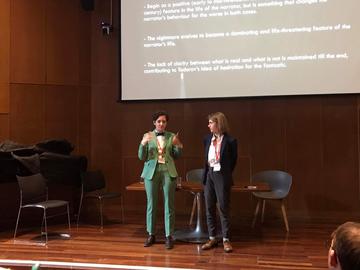The one-day conference “Nightmare/s in the Long Nineteenth Century” took place on 19 May 2022 at King’s College in Cambridge and explored the multifaceted theme of nightmares – both as frightening dreams and, in their personified form, terrifying creatures – in the arts, thought, and culture of the nineteenth century. It was generously funded by the Open-Oxford-Cambridge AHRC DTP as a student-led training event and co-organised by Greta Colombani (University of Cambridge) and Frances Clemente (University of Oxford).

The idea for the conference came to us while we were talking about our research projects, and the topic of nightmares came up in relation to our shared interest in ideas of otherness and the unconscious at opposite ends of the nineteenth century. To our surprise, despite the pervasive fascination with nightmares that characterises this period, studies on the subject tended to focus on specific issues and limited aspects of the phenomenon. We thought it would be interesting to have a broader discussion on the relevance of nightmares to the nineteenth century, encouraging a dialogue between different approaches and perspectives.
The conference featured a variety of papers from different disciplines across the arts & humanities and with different geographical focus areas by eight doctoral students from the Universities of Cambridge and Oxford and the Royal Northern College of Music. The topics ranged from British Romantic poetry and Gothic novels to queer theory, Benjamin Britten’s operas, Austrian apocalyptic fiction, and French fantastic tales. The programme was completed by two keynote lectures: an enlightening presentation on incubi and the prehistory of the vampire in Le Fanu’s Carmilla by Prof Fabio Camilletti from the University of Warwick and a richly detailed overview of the specificities of nineteenth-century figurations of nightmares by Dr Louise Milne from the Edinburgh College of Art.
Overall, the conference was a success and received very positive feedback from the attendees! In-person attendance reached full capacity and the keynote talks were live streamed to an even wider audience. Fostering and taking part in a conversation between people with different disciplinary backgrounds and methodological approaches but a common interest in nineteenth-century nightmares turned out to be an incredibly enriching experience, which gave us new insights into questions about conscience, the mind, fear, the Other, and the fear of the Other. Organising the conference also provided us with a precious opportunity to develop a great number of academic and transferable skills covering the areas of time and budget management, logistics, and communications.